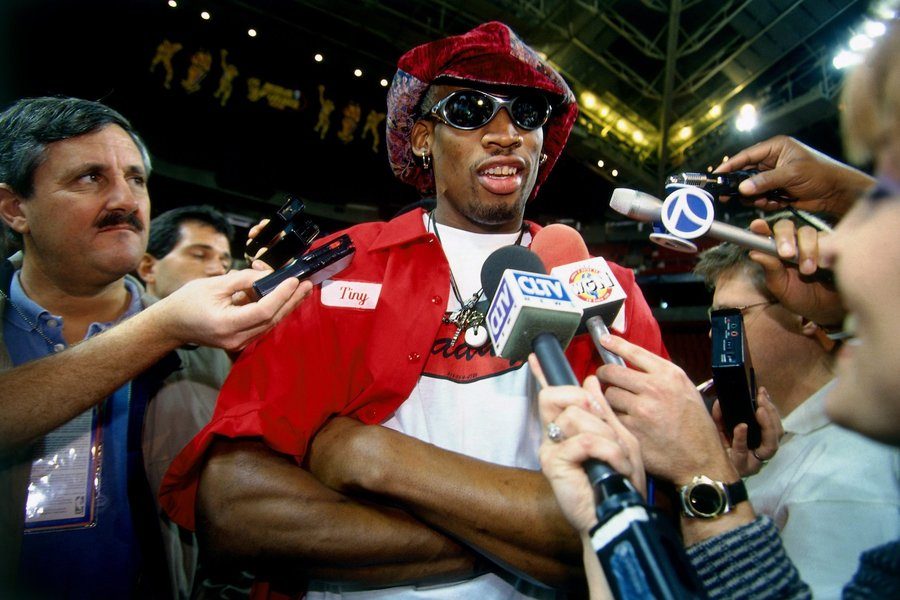SUMMARY
This is AI generated summarization, which may have errors. For context, always refer to the full article.

MANILA, Philippines – It has been said over and over again. The media has said it, and the men themselves.
Michael Jordan never won an NBA title without Scottie Pippen, and vice versa.
Dennis Rodman, on the other hand, already won two without those two.
As a member of the infamous “Bad Boys” Detroit Pistons team that sowed fear in the hearts of even the toughest players in the league, Rodman rose to stardom as a peerless rebounder and defender that complemented perfectly with his team.
With two-way stars like Isiah Thomas and Joe Dumars powering Detroit’s offensive gears, the offensively-limited Rodman played the role of a defensive anchor – an anchor that was swung to opponents’ faces whenever the opportunity presented itself.
This natural cohesion of skill sets, along with the singular mindset of physically and mentally hurting anyone who stood in their way, catapulted the Pistons to two straight NBA titles from 1989 to 1990.
Everyone benefited from the ever-green light to flat-out start hockey fights on the hardwood, most especially the fiery Rodman. It was a match made in heaven – or hell, depending on whose perspective is used.
Fast-forward to 1995, however, and Rodman was traded to the Chicago Bulls, joining Jordan, Pippen and the franchise that he helped dismantle in the playoffs just a few years prior on the way to his two titles.
Rodman, then a two-time champion, All-Star and Defensive Player of the Year, was traded for Will Perdue, a 7-foot-1 center who only averaged 4.6 points, 4.1 rebounds and 13.4 minutes in 7 years with the Bulls.
How did that even happen?
The day Dennis Rodman died
The year was 1992. The Pistons were an aging team on the outside looking in, as the championship-winning Bulls had already shaped the Eastern Conference landscape to their liking.
Rodman, who had just gone through an embarrassing first-round playoff exit at the hands of the New York Knicks, went through another emotional hurdle as Chuck Daly, his head coach and father figure, resigned in the offseason.
Per a 2006 report by ESPN, Rodman responded by skipping preseason camp, forcing the Pistons to suspend the enigmatic forward without pay and slap a $68,000 fine.
Rodman ended a rocky year in the worst possible way as he was left alone by his estranged wife Annie Bakes, who took their daughter Alexis to her hometown of Sacramento, California.
This all culminated in a fateful day in February 1993, when Rodman was found asleep by police – who had responded to a call by the Pistons – in his truck by the parking lot of the Palace of Auburn Hills with a loaded gun.
Although he initially denied reports that he was contemplating on taking his own life, Rodman backtracked and confirmed the suspicion 4 years later in his biography As Bad As I Wanna Be.
That night, Rodman had indeed killed himself, or at least a part of it.
“I decided that instead [of killing myself] I was gonna kill the impostor that was leading Dennis Rodman to a place he didn’t want to go. So I just said, ‘I’m going to live my life the way I want to live it and be happy doing it.’”
“At that moment, I tamed my whole life around. I killed the person I didn’t want to be.”
Since that day, Rodman became more animated as his wild antics leaked outside the court. He started to famously dye his hair and he even got into a high-profile affair with music superstar Madonna.
Summarizing that transition in one go would be another article of its own, but Rodman at least saved the burden by encompassing it in one image.
In 1997 at the book launch of As Bad As I Wanna Be, the tough-as-nails superstar showed up… in a bridal gown.
San Antonio, spurned
Rodman’s intensifying antics spelled immediate doom for the Pistons as on October 1, 1993, the team gave in to his trade demand and dealt him to the San Antonio Spurs for scoring forward Sean Elliot.
Although Rodman still won his third straight rebounding title after averaging 17.3 boards and 4.7 points in 79 appearances for his new team, it soon became evident that he was just doing more harm than good with his sustained self-destruction.
He had his last straw with Spurs management the year after as he took a leave of absence, was suspended twice and shortened his regular season to just 49 games following a motorcycle accident.
While Rodman actually returned and helped the Spurs reach the Western Conference finals, it would prove to be his last rodeo with the team as Hakeem Olajuwon and the Houston Rockets eliminated their Texan rivals in 6 games.
That offseason, Rodman demanded a new contract, but was instead dealt to the Bulls for a chance to take a breath with a steadier locker room presence in Perdue.
On the day of the trade, the San Antonio Express-News emphasized that Rodman was a “problem child” who had “a hue on top to match his moods.”
The Bulls got the power forward they needed to replace Horace Grant, while the Spurs got their peace of mind.
Chicago went on to win 3 more championships from 1996 to 1998 with Rodman while San Antonio rose from the ashes of the Bulls’ fallen empire with its first-ever franchise title in 1999.
All teams involved got the success story they wanted one way or another, but more importantly for Rodman, he got the freedom he wanted all along.
“I just took the chance to be my own man. I just said: ‘If you don’t like it, kiss my ass.’” – Rappler.com
Add a comment
How does this make you feel?
There are no comments yet. Add your comment to start the conversation.